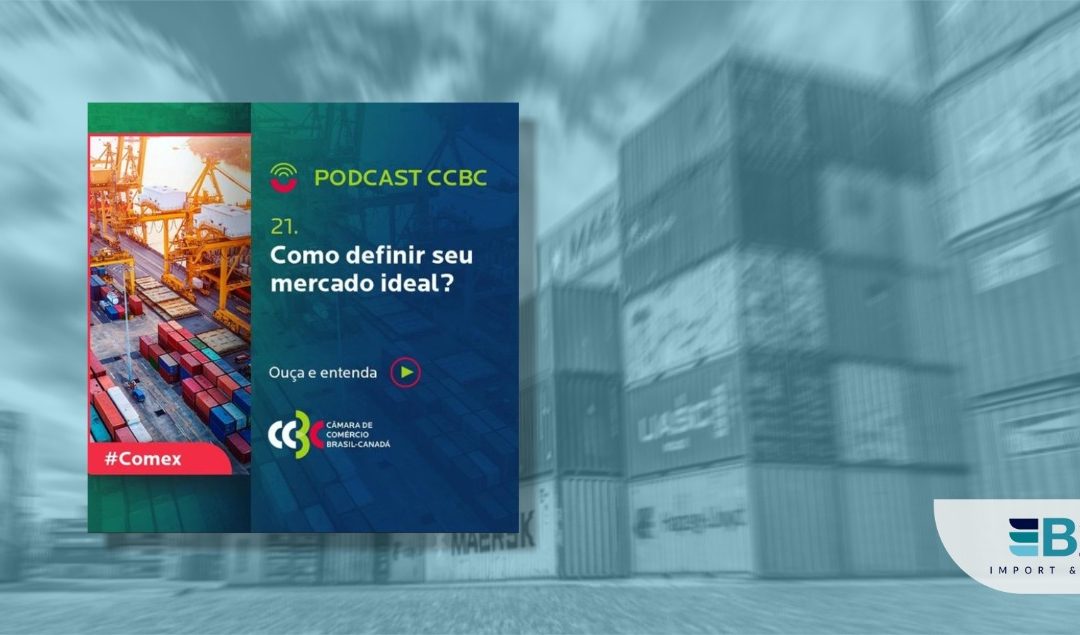B21 businesswoman, Anna Bastos participates in a chat at the Brazil Canada Chamber of Commerce
How to choose the ideal market for foreign trade? What should be considered, analyzed? How to define the steps for an internationalization project?
These are some of the questions answered by the B21 Import & amp; Export, Anna Bastos , in this week’s Foreign Trade podcast at the Brazil-Canada Chamber of Commerce.
Check out the complete program!
Here are some insights on choosing the ideal market for foreign trade:
How we choose Canada for our customers
Anna Bastos: We represent several products, but the vast majority are foods with healthy appeal, without preservatives, some vegan, gluten and lactose, for example.
When researching the countries that value this, we find Canada with a huge appreciation of the typically Brazilian product. It is a demanding market, which values healthy and quality products. And, at the same time, a country that has a high purchasing power, which makes it possible for our customers to work with prices.
Foreign trade steps for Canada
Anna Bastos: After understanding that Canada was a priority, we started a market research project. We seek information on prices, competitors, packaging used, points of sale. The first analysis was from a distance, with help also from the Brazil Canada Chamber of Commerce.
Secondly, we made an on-site visit from the International Mission to SIAL in Canada itself.
The mission, besides allowing us to take the products to present to the market, also showed us the receptivity, acceptance of each product.
Finally, the third stage involved many meetings and technical visits during the trip. There we fine-tune the points of negotiation, price, packaging, we deeply understand the market and possible partnerships.
Important partnerships for choice
Anna Bastos: We had a very important partnership with the Chamber itself, which knows a lot and organized many meetings in the mission, but other partnerships were essential for business: local companies, Canadian distributors of the products.
They are able to give us a clearer view of the market, of who is in practice. Issues such as expiration date, delivery logistics, truck loading, fees that we did not have before in price formation and that could eat up the profit margin.
Contact with people in the country, in our opinion, makes all the difference in the business.
Importance of packaging adaptation
Anna Bastos: Many things that are not valued in Brazil, abroad, are very important and make a difference between a product standing on the shelf and one that sells.
This goes for certifications, for example. Many vegan products, for example, had this written on the packaging, but not certification. In Canada, this issue is also a price differential.
In addition, telling the story of the product on the packaging itself – where it is produced, by whom, how it works – also values the product.
Price formation
Anna Bastos: There are several items that need to be considered for pricing. The price in Brazil, in the chosen country, the values that affect the operation – fees, freight, international insurance -, in addition to the reverse account that we do, to see the price of the competing product if it comes to Brazil.
It is also necessary to consider the price of adapting products to the necessary quality, distribution, tasting, kits delivered to the market.
Importance of tasting for food products
Anna Bastos: We had the experience of SIAL’s mission of, in addition to exhibiting at the fair, presenting products to potential customers at a specific dinner.
The food depends a lot on the taste, the quality that the customer will know when tasting and that makes a lot of difference.
Tasting is a differential that must be considered by those who want to export. When talking about food products, the sample is essential.
Importance of the fair and international mission
Anna Bastos: We had contact at SIAL with many Brazilians who live in Canada and with several possible buyers. We feel that they are practical, objective, but very demanding.
They want to know the product, the quality, origin, understand whether or not it fits into the product line. And they are extremely segmented, organized in that sense.
Going to Canada, the chosen market, made all the difference to close the deal for our customers. It is very different for the representative to receive an email from us talking about the product and get to know closely, experiment, chat with us directly.
The Canadian market
Anna Bastos: It is a demanding market, but with huge potential. Many Brazilians have not yet discovered and exploited this potential.
As in any foreign trade business, it is an investment. Whoever proposes to work with internationalization, place their product in any market, needs planning, investing in marketing, packaging, travel, sending samples and being on an international mission.
Foreign trade cannot be an adventure, it needs to be thought of as a company’s strategy and a lot of planning to be successful.
Follow B21 on Instagram! And stay on top of everything about choosing the ideal market for foreign trade.

Recent Comments